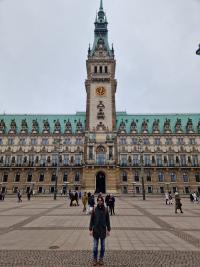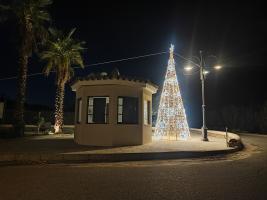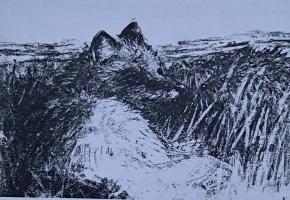Copy Link
Add to Bookmark
Report
NL-KR Digest Volume 14 No. 56

NL-KR Digest Mon Sep 25 21:12:47 PDT 1995 Volume 14 No. 56
Today's Topics:
Position: CMU: IR Research Faculty - Info. Retrieval
Program: EPIA'95 - 7th Port. AI, Oct 95, Funchal
CFP: ICCS '96 4th Conceptual Structures, Aug 96, Sydney
Announcement: Questionnaire on naming shapes and sizes, Bielefeld
* * *
Subcriptions: listserv-style administrative requests to
nl-kr-request@ai.sunnyside.com.
Submissions, policy, questions: nl-kr@ai.sunnyside.com
To speed up processing of your submission write to
listserv@ai.sunnyside.com with the message:
GET nl-kr style
Back issues:
FTP: ai.sunnyside.com:/pub/nl-kr/Vxx/Nyyy
/pub/nl-kr/Vxx/INDEX
Gopher: ai.sunnyside.com, Port 70, in directory /pub/nl-kr
Email: write to LISTSERV@AI.SUNNYSIDE.COM, omit subject, mail command:
GET nl-kr nl-kr_file_list
Web: http://ai.sunnyside.com/pub/nl-kr
Editors:
Al Whaley (al@ai.sunnyside.com) and
Chris Welty (weltyc@sigart.acm.org).
-----------------------------------------------------------------------
Date: Sat, 16 Sep 1995 11:52:55 -0400 (EDT)
From: Bob Carpenter <bc10+@andrew.cmu.edu>
To: Sigparse-List@cs.cmu.edu, nl-kr@snyside1.sunnyside.com, colibri@let.ruu.nl
Subject: Position: CMU: IR Research Faculty - Info. Retrieval
RESEARCH FACULTY POSITION IN INFORMATION RETRIEVAL
AT CARNEGIE MELLON UNIVERSITY
The Center for Machine Translation and the School of Computer Science
at Carnegie Mellon University (CMU) are seeking candidates for one or
more research faculty positions in Information Retrieval (IR). The
position(s) available range from Research Associate (equivalent to
postdoctoral fellow) to Research Scientist (equivalent to Assistant
Professor) and Senior Research Scientist (equivalent to untenured
Associate Professor). Both position and salary will be commensurate
with experience. A PhD is required, preferably in Computer Science
or closely related field, as is a strong research record in IR, and
significant systems experience.
The ideal candidate(s) will have broad experience in different aspects
of text processing, including information retrieval, text categorization,
and information extraction from text. Knowledge of classical IR
techniques, statistical methods and linguistic approaches is desirable,
as is familiarity with natural language processing and machine learning
techniques. HCI experience, fluency in a foreign language, and a strong
algorithms and mathematical background are also a plus.
The selected candidate(s) is(are) expected to contribute to the IR
component of CMU's Digital Library project (Informedia), and/or conduct
their own original funded research and/or work collaboratively with other
CMU faculty on projects such as information-seeking web agents.
Interested candidates should send their curriculum vita to the
address below as soon as they can, and no later than October 31, 1995.
Please include a cover letter with the names and email addresses of
three or more references and a brief statement of how well the educational
and professional background and interests match the criteria set forth
above. Email postscript submissions are preferred.
Information Retrieval
Center for Machine Translation
School of Computer Science
Carnegie Mellon University
Pittsburgh PA 15213 USA
info-ret@nl.cs.cmu.edu
-----------------------------------------------------------------------
From: Nuno Joao Mamede <njm@cupido.inesc.pt>
To: nl-kr@cs.rpi.edu
Subject: Program: EPIA'95 - 7th Port. AI, Oct 95, Funchal
Date: Sun, 17 Sep 95 20:27:34 +0100
EPIA'95 - PRELIMINARY PROGRAM
SEVENTH PORTUGUESE CONFERENCE
ON
ARTIFICIAL INTELLIGENCE
Casino Park Hotel, Funchal, Madeira Island, Portugal
3-6 October, 1995
(Under the auspices of the Portuguese Association for AI)
The 7th Portuguese Conference on Artificial Intelligence will be held
at Funchal, Madeira Island, Portugal, October 3-6, 1995. As in the
past, EPIA 95 is an international conference with English as the
official language. The conference covers all areas of Artificial
Intelligence, including theoretical areas, foundational areas, and
applications. The scientific program consists of invited lectures,
tutorials, demonstrations and paper presentations. There will also be
parallel workshops on Expert Systems, Fuzzy Logic and Neural Networks,
and Applications of AI to Robotics and Vision Systems.
= = = = = = = = = = = = = =
FINAL PROGRAM (Summary)
= = = = = = = = = = = = = =
Tuesday - October, 3 95
~~~~~~~~~~~~~~~~~~~~~~~
9:00 - 12:30 TUTORIAL 1 - Artificial Life and Autonomous Robots
Luc Steels
9:00 - 12:30 TUTORIAL 3 - Introduction to Artificial Intelligence
Ernesto Costa (in Portuguese)
14:30 - 18:00 TUTORIAL 2 - Virtual Reality - The AI perspective
David Hogg
14:30 - 18:00 TUTORIAL 4 - Design of Expert Systems
Ernesto Morgado (in Portuguese)
Wednsday - October, 4 95
~~~~~~~~~~~~~~~~~~~~~~~~
9:00 - 9:30 OPENING SESSION
9:40 - 10:30 QUALITATIVE REASONING
10:30 - 10:50 Coffee break
10:50 - 12:30 NEURAL NETWORKS & DISTRIBUTED ARTIFICIAL INTELLIGENCE
10:50 - 12:30 FUZZY LOGIC & NEURAL NETWORKS WORKSHOP
12:30 - 14:00 Lunch
14:00 - 15:30 Invited Lecture by LUIS B. ALMEIDA (IST - Portugal)
"The Connectionist Paradigm and AI"
15:30 - 15:50 Coffee break
15:50 - 18:00 BELIEF REVISION & NON-MONOTONIC REASONING
15:50 - 18:30 FUZZY LOGIC & NEURAL NETWORKS WORKSHOP
15:50 - 18:30 APPLICATIONS OF EXPERT SYSTEMS WORKSHOP
20:00 - Welcome Dinner
(With a performance of the Univ. of Madeira "tuna")
Thursday - October, 5 95
~~~~~~~~~~~~~~~~~~~~~~~~
9:00 - 10:30 Invited Lecture by RODNEY BROOKS (MIT - USA)
"The Evolutionist Approach - Past, Present and Future
of AI"
10:30 - 10:50 Coffee break
10:50 - 12:30 APPLICATIONS OF EXPERT SYSTEMS WORKSHOP
10:50 - 11:40 ROBOTICS AND CONTROL
11:40 - 12:30 POSTER SECTION
12:30 - 14:00 Lunch
14:00 - 15:15 MACHINE LEARNING
15:15 - 15:35 Coffee break
15:35 - 17:05 Invited Lecture by MARVIN MINSKY (MIT - USA)
"Why Human Brains Can't Really Think"
17:15 - 18:30 Visit to the Madeira Wine Cellars
Friday - October, 6 95
~~~~~~~~~~~~~~~~~~~~~~
9:00 - 10:30 INVITED LECTURE by Manuela Veloso (CMU - USA)
"Planning and Learning in Intelligent Agents"
10:30 - 10:50 Coffee break
10:50 - 12:30 STREAM 1: PLANNING AND CASE-BASED REASONING
10:50 - 12:30 STREAM 2: CONSTRAINT-BASED REASONING
10:50 - 12:30 APPLICATIONS OF AI TO ROBOTICS AND VISION SYSTEMS
WORKSHOP
12:30 - 14:00 Lunch
14:00 - 15:30 STREAM 1: AUTOMATED REASONING AND THEOREM PROVING
14:00 - 15:30 STREAM 2: GENETIC ALGORITHMS & THEORY OF COMPUTATION
14:00 - 15:30 APPLICATIONS OF AI TO ROBOTICS AND VISION SYSTEMS
WORKSHOP
15:30 - 15:50 Coffee break
15:50 - 17:30 PANNEL (The Next Frontiers of AI: the Role of Foundations)
18:00 - 19:00 APPIA meeting
20:00 Farewell Dinner
(with folklore dances show)
Saturday - October, 7 95
~~~~~~~~~~~~~~~~~~~~~~~~
TOUR 1 - Island Tour (full day)
TOUR 2 - Ribeiro Frio/Portela Walking Tour (full day)
TOUR 3 - Eira do Serrado (half day)
= = = = = = = = = = = = = =
PAPERS TO BE PRESENTED IN EACH SESSION
= = = = = = = = = = = = = =
AUTOMATED REASONING AND THEOREM PROVING
~~~~~~~~~~~~~~~~~~~~~~~~~~~~~~~~~~~~~~~
Terminological Meta-Reasoning by Reification and Multiple Contexts
Klemens Schnattinger, Udo Hahn, Manfred Klenner
CLIF, Freiburg University, Germany
A New Continuous Propositional Logic
Riccardo Poli, Mark Ryan, Aaron Sloman
SCS, The University of Birmingham, UK
Super-Polynomial Speed-Ups in Proof Length by New Tautologies
Uwe Egly
FG Intellektik, TH Darmstadt, Germany
BELIEF REVISION
~~~~~~~~~~~~~~~
Belief Revision in Non-Monotonic Reasoning
Jose Alferes, Luis Moniz Pereira, T. Przymusinski
DM, U. Evora, and CRIA, U. Nova de Lisboa, Portugal, and
University of California at Riverside, USA
A New Representation of JTMS
Truong Quoc Dung
IRIDIA, Universite Libre de Bruxelles, Belgium
CONSTRAINT-BASED REASONING
~~~~~~~~~~~~~~~~~~~~~~~~~~
The Retrieval Problem in a Concept Language with Number Restrictions
Aida Vitoria, Margarida Mamede, Luis Monteiro
DI, Universidade Nova de Lisboa, Portugal
Formalizing Local Propagation in Constraint Maintenance
Systems
Gilles Trombettoni
INRIA-CERMICS, France
A Dependency Parser of Korean Based on Connectionist/Symbolic
Techniques
Jong-Hyeok Lee, Geunbae Lee
Pohang University of Science and Technology, Korea
A Symbiotic Approach to Arc and Path Consistency Checking
Pierre Berlandier
INRIA-CERMICS, France
DISTRIBUTED ARTIFICIAL INTELLIGENCE
~~~~~~~~~~~~~~~~~~~~~~~~~~~~~~~~~~~
Where Do Intentions Come From?: A Framework for Goals and Intentions
Adoption, Derivation and Evolution
Graca Gaspar, Helder Coelho
Faculdade de Ciencias de Lisboa, and INESC, Portugal
A Closer Look to Artificial Learning Environments
Helder Coelho, Augusto Eusebio, Ernesto Costa
INESC, Portugal, and DEI, Universidade de Coimbra, Portugal
Building Multi-Agent Societies from Descriptions to Systems:
Inter-Layer Translations
Helder Coelho, Luis Antunes, Luis Moniz
INESC, Portugal
GENETIC ALGORITHMS
~~~~~~~~~~~~~~~~~~
GA/TS: A Hybrid Approach for Job Shop Scheduling in a Production
System
Jose Ramon Zubizarreta, Javier Arrieta
Facultad de Informatica de San Sebastian, Spain
MACHINE LEARNING
~~~~~~~~~~~~~~~~
A Controlled Experiment: Evolution for Learning Difficult Image
Classification
Astro Teller, Manuela Veloso
Carnegie Mellon University, USA
Minimal Model Complexity Search
Chris McConnell
CMU School of Computer Science, USA
Characterization of Classification Algorithms
Joao Gama, Pavel Brazdil
LIACC, Universidade do Porto, Portugal
NEURAL NETWORKS
~~~~~~~~~~~~~~~
Neurons, Glia and the Borderline Between Subsymbolic and Symbolic
Processing
J. G. Wallace, K. Bluff
Swinburne University of Technology, Australia
NON-MONOTONIC REASONING
~~~~~~~~~~~~~~~~~~~~~~~
Arguments and Defeat in Argument-Based Nonmonotonic Reasoning
Bart Verheij
University of Limburg, The Netherlands
A Preference Semantics for Ground Nonmonotonic Modal Logics
Daniele Nardi, Riccardo Rosati
DIS, Universita di Roma ``la Sapienza", Italy
Logical Omniscience vs. Logical Ignorance On a Dilemma of Epistemic
Logic
Ho Ngoc Duc
ILPS, University of Leipzig, Germany
PLANNING AND CASE-BASED REASONING
~~~~~~~~~~~~~~~~~~~~~~~~~~~~~~~~~
On the Role of Splitting and Merging Past Cases for Generation of
New Solutions
Carlos Bento, Penousal Machado, Ernesto Costa
DEI, Universidade de Coimbra, Portugal
Theorem Proving by Analogy - A Compelling Example
Erica Melis
Department of AI, University of Edimburgh, Scotland
Non-Atomic Actions in the Situation Calculus
Jose Julio Alferes, Renwei Li, Luis Moniz Pereira
CRIA and DCS, Universidade Nova de Lisboa, Portugal
Planning under Uncertainty: A Qualitative Approach
Nikos Karacapilidis
FIT.KI, GMD, Sankt Augustin, Germany
QUALITATIVE REASONING
~~~~~~~~~~~~~~~~~~~~~
Qualitative Reasoning under Uncertainty
Daniel Pacholczyk
DMI, U.F.R., Science d'Angers, France
Systematic Construction of Qualitative Physics-Based Rules for
Process Diagnostics
Jaques Reifman, Thomas Y.C. Wei
Argonne National Laboratory, USA
ROBOTICS AND CONTROL
~~~~~~~~~~~~~~~~~~~~
Integrated Process Supervision (IPS): A Structured Approach to
Expert Control
Chai Quek, P.W. Ng, M. Pasquier
Nanyang Technological University, Singapore
Using Stochastic Grammars to Learn Robotic Tasks
Pedro Lima, George Saridis
ISR, Technical Univ. of Lisbon, Portugal,
and Rensselaer Polytechnic Institute, USA
THEORY OF COMPUTATION
~~~~~~~~~~~~~~~~~~~~~
Constraint Categorial Grammars
Luis Damas, Nelma Moreira
LIACC, Universidade do Porto, Portugal
A New Translation Algorithm from Lambda Calculus into Combinatory
Logic
Sabine Broda, Luis Damas
LIACC, Universidade do Porto, Portugal
POSTER SECTION
~~~~~~~~~~~~~~
Interlocking Multi-Agent and Blackboard Architectures
Bernhard Kipper
DCS, University of Saarbrucken, Germany
A Model Theory for Paraconsistent Logic Programming
Carlos Viegas Damasio, Luis Moniz Pereira
CRIA, and DCS, Universidade Nova de Lisboa, Portugal
Promoting Software Reuse Through Explicit Knowledge Representation
Carmen Fernandez-Chamizo, Pedro A. Gonzalez-Calero,
Mercedes Gomez-Albarran
Universidad Complutense, Spain
Efficient Learning in Multi-Layered Perceptron Using the
Grow-And-Learn Algorithm
Gildas Cherruel, Bassel Solaiman, Yvon Autret
Univ. de Bretagne Occidentale, and TNI, and ENSTB, France
An Non-Diffident Combinatorial Optimization Algorithm
Gilles Trombettoni, Bertrand Neveu
INRIA-CERMICS, France
Modelling Diagnosis Systems with Logic Programming
Iara Mora, Jose Alferes
CRIA, U. Nova de Lisboa, and DM, U. Evora, Portugal
Agreement: A Logical Approach to Approximate Reasoning
Luis Custodio, Carlos Pinto-Ferreira
ISR, Technical University of Lisbon, Portugal
Constructing Extensions by Resolving a System of Linear Equations
Messaoudi Nadia
Universite Aix-Marseille II, France
Presenting Significant Information in Expert System Explanation
Michael Wolverton
Daresbury Rutherford Appleton Laboratory, UK
A Cognitive Model of Problem Solving with Incomplete Information
Nathalie Chaignaud
LIPN, Universite Paris-Nord, France
Filtering Software Specifications Written In Natural Language
Nuria Castell, Angels Hernandez
Universitat Politecnica de Catalunya, Spain
Parsimonious Diagnosis in SNePS
Pedro A. Matos, Joao P. Martins
DEM, Technical University of Lisbon, Portugal
Syntactic and Semantic Filtering in a Chart Parser
Sayan Bhattacharyya, Steven L. Lytinen
University of Michigan, and DePaul University, USA
GA Approach to solving Multiple Vehicle Routing Problem
Slavko Krajcar, Davor Skrlec, Branko Pribicevic,
Snjezana Blagajac
Faculty of Electrical Eng. and Computing, Croatia
Multilevel Refinement Planning in an Interval-Based Temporal Logic
Werner Stephan and Susanne Biundo
German Research Center for AI, Germany
APPLICATIONS OF EXPERT SYSTEMS WORKSHOP
~~~~~~~~~~~~~~~~~~~~~~~~~~~~~~~~~~~~~~~
Wednesday, 4
15:50 - 16:15
CGD - An Expert System for Loan Analysis Decision
Vasco Moreira, Andre Frazao, Elisabete Silva, Ernesto Costa
Caixa Geral de Depositos, Dir. Organizacao Informatica
Lisboa, Portugal
16:15 - 16:40
A Quantitative Method for Performing A Cost-Benefit Analysis of
Expert System Projects
Ramu Kannan, Reza Khorramshahgol, Mohan Tanniru
Dept. of Management Science and Economics,
Coppin State College, Baltimore, USA
16:40 - 17:05
DARE: a Knowledge-Based System for the Diagnosis of Neuromuscular
Disorders
J. Cruz, P. Barahona, A. P. Figueiredo, M. Veloso, M. Carvalho
UNINOVA, Portugal
17:05 - 17:30
A Cooperative Multi-Agent System for Strategic Decision Making
Suzanne Pinson
Jorge Louca
Universite Paris IX - Dauphine, Paris, France
17:30 - 17:55
A Hybrid Model for Classification Expert Systems
Sergio Rosa, Beatriz Leao
Instituto de Informatica UFRGS, Porto Alegre, Brasil
Thursday, 5
10:50 - 11:15
PERMEX - Expert System for Corrosion Failure Analysis
Fernando Lopes, A. Novais, N. Mamede, C. Rangel
INETI, DMS, Lisboa, Portugal
11:15 - 11:40
Architectural Aspects of an Intelligent DSS for Flow Shop
Production Control
Ioannis Hatzilygeroudis, D. Sofotassios, N. Dendris, P. Spirakis,
A. Tsakalidis
Dept. of Computer Engin. and Informatics, Univ. of Patras, Greece
11:40 - 12:05
Advances in Explanation Facilities for Expert Systems
Keith Darlington
School of Computing, Information Systems and Mathematics
South Bank University, London, UK
12:05 - 12:30
A Deferred Communication in a Parallel Distributed Expert System
Shell
Wided Lejouad
SECOIA Project, Sophia Antipolis, France
APPLICATIONS OF AI TO ROBOTICS AND VISION SYSTEMS WORKSHOP
~~~~~~~~~~~~~~~~~~~~~~~~~~~~~~~~~~~~~~~~~~~~~~~~~~~~~~~~~~
Friday, 6
10:50 - 11:15
Designing and Implementing Real Walking Agents Using Virtual Environments
Aleix Martinez
Universitat Autonoma de Barcelona, Dept. Informatica, Spain
11:15 - 11:40
Multi-Layer Perceptrons for Task Visual Servoing in Robotics
Nadine Rondel, Gilles Burel
Thomson CSF-LER, France
11:40 - 12:05
Heuristic Autonomous Mobile Robot Using Visual Servoing
Jean-Charles Bonin, Fernandoo De Carvalho Gomes
Laboratorio de Inteligencia Artificial-LIA, Fortaleza, Brasil
12:05 - 12:30
An Integrated Approach to Position a Robot Arm in a System for
Planar Part Grasping
Pedro Sanz, Juan Domingo
Universitat Jaume I, Dpto. Informatica, Castellon, Spain
14:00 - 14:25
Learning and Recall of Robot Manipulator Motions Using Driver Programs
Frank Smieja, Uwe Bayer
GMD, Schloss Birlinghoven, Germany
14:25 - 14:50
Selective Visual Perception Driven by Cues from Speech Processing
Reinhard Moratz
AG Angewandte Informatikj, Universitaet Bielefeld, Germany
14:50 - 15:15
Autonomous Robots and Active Vision Systems: Issues on Architectures
an Integration
Helder Araujo, Jorge Dias, Jorge Batista, Paulo Peixoto
ISR-Coimbra, Universidade de Coimbra, Portugal
15:15 - 15:35
Learning from Perception, Success and Failure in a Team of Autonomous
Mobile Robots
Arvin Agah, George Bekey
Inst. for Robotics and Intell.Syst., Univ. of Southern California, USA
FUZZY LOGIC & NEURAL NETWORKS WORKSHOP IN ENGINEERING
~~~~~~~~~~~~~~~~~~~~~~~~~~~~~~~~~~~~~~~~~~~~~~~~~~~~~
Wednesday, 4 - Session 1
10:50 - 11:15
A Fuzzy Logic Controller for Supraconductivity Measuring
N. Zimic, J. Ficzko, M. Mraz, J. Virant
Faculty of Electrical & Computer Engineering Science
University of Ljubljana, Slovenia
11:15 - 11:40
Complex Data and Fuzziness in Database Applications
Adnan Yazici
Dept. of Computer Engineering, Middle East Technical University, Turkey
11:40 - 12:05
Car License Plate Recognition with Neural Networks and Fuzzy Logic
J. Nijhuis, et.al.
Dept. of Computer Science, Groningen University, The Netherlands
12:05 - 12:30
Similarity-Based Self-organized Clustering
Jurgen Rahmel
Center for Learning Systems & Applications,
University of Kaiserslautern, Germany
15:50 - 16:15
On the Representation of Data for Optimal Learning
M. Brugge, J. Nijhuis, W. Jansen, H. Drenth, L. Spaanenburg
Dept. of Computer Science, Groningen University, The Netherlands
16:15 - 16:40
Artificial Neural Net-Based Controllers for Real Process Control
Petr Pivonka, Jan Zizka
Dept. of Automatic Control and Instrumentation
Technical University of Brno, Czech Republic
16:40 - 17:05
A Production Line for Generating Clinical Decision Support Systems
Patrik Eklund
Dept. of Computing Science, Umea University, Sweden
17:05 - 17:30
Knowledge Discovery Using Hierarchical Connectionist
Marie Pai, Robin Ying
AT&T Bell Laboratories, USA
17:30 - 17:55
Growing Filters for Finite Impulse Response Networks
M. Diepenhorst, J. Nijhuis, R. Venema, L. Spaanenburg
Dept. of Computer Science, Groningen University, The Netherlands
= = = = = = = = = = = = = =
ENQUIRIES ADDRESS
= = = = = = = = = = = = = =
EPIA'95 - INESC E-mail: epia95@inesc.pt
Av. Alves Redol, 9 Fax: 351-1-525843
1000 Lisboa Voice: 351-1-3100325
PORTUGAL
Home Page: http://www.isr.ist.utl.pt/~cpf/epia95
= = = = = = = = = = = = = =
SUPPORTERS
= = = = = = = = = = = = = =
Banco Nacional Ultramarino Governo Regional da Madeira
Instituto Superior Tecnico SISCOG - Sistemas Cognitivos
INESC CITMA
IBM TAPair Portugal
=========================== Last Line ================================
-----------------------------------------------------------------------
To: comp-ai-nlang-know-rep@munnari.oz.au
From: Peter.Eklund@Adelaide.Edu.Au (Peter Eklund)
Subject: CFP: ICCS '96 4th Conceptual Structures, Aug 96, Sydney
Date: 18 Sep 1995 07:44:56 GMT
_____________________________________________________________________
FIRST CALL FOR PAPERS
4TH INTERNATIONAL CONFERENCE ON CONCEPTUAL STRUCTURES (ICCS '96)
SYDNEY, AUSTRALIA
AUGUST 19-22, 1996
IMPORTANT DATES
Submission postmark deadline January 15, 1996
Notification of acceptance February 23, 1996
Camera-ready copy April 12, 1996
Conceptual graphs are a logic-based formalism for knowledge
representation based on the existential graphs of Charles S. Peirce
and semantic networks. Conceptual structures have been widely used as
a semantic representation for natural language and as a graphic system
of logic for knowledge-based expert systems, theorem provers, and
database design. Significant gains have been made in the storage and
retrieval of DBMS information coupled with knowledge-based system
problem solving capability.
Researchers have developed a sizable software base and continue to
build upon it. Successful implementations include: rule-based
systems, database systems, knowledge-based systems, knowledge
engineering tools, enterprise modeling, management information
systems, conceptual information retrieval, medical informatics and
natural language applications, among others.
Authors are invited to submit papers describing both theoretical and
practical research involving conceptual structures and related
encoding, search, and order-based techniques. Papers accepted or
under review by other conferences or journals are not acceptable as
submissions.
The International Conference on Conceptual Structures (ICCS) is the
annual conference and principle research forum in the practice and
theory of conceptual structures. The main proceedings of the conference are
published in the Springer Verlag lecture notes on Computer Science
series. Previous ICCS conferences have been held at the University of
California, Santa Cruz (ICCS '95), The University of Maryland
(ICCS '94), Universite Laval, Quebec City (ICCS '93).
_____________________________________________________________________
TOPICS
Papers are invited on the following topics:
- theory of conceptual structures;
- case studies and applications using conceptual structures;
- conceptual analysis;
- conceptual lattice theory;
- term encoding and conceptual structures;
- natural language processing with conceptual structures;
- theories of ontology and higher taxonomic structure;
- graph matching and grammars;
- graph algorithms for conceptual structures
- software tools for conceptual structures
- foundations and philosophy of Peirce's existential graphs
- machine learning and conceptual structures;
- human-computer issues and conceptual structures;
- computability and conceptual structures;
- theorem proving and conceptual structures;
- approximate reasoning and conceptual structures;
- knowledge acquisition and conceptual structures;
- comparisons with other knowledge representations.
AUTHOR INFORMATION
Papers are limited to 12 pages, 10 point font size, text width (4.88
in) 12.2 cm, text height 7.72 in (19.3 cm). Latex users: please use
llncs.sty (available by ftp from trick.ntp.springer.de,
pub/tex/latex/llncs/llncs.sty). Shorter papers (up to 6 pages in
length) are also welcome. Authors are requested to submit five (5)
hardcopies of their paper. Alternatively, electronic submissions of
papers (postscript output) are encouraged.
Authors are requested to attach title pages to their submissions
bearing their names, addresses, telephone numbers, fax numbers and
e-mail addresses. In addition, authors are asked to include abstracts
of approximately twenty (20) lines with the title page. Papers
(hardcopy or electronic submissions) must be postmarked on or before
Monday, January 15, 1996.
ADDRESS: ICCS'96
Department of Computer Science
The University of Adelaide
5005 Australia
email: iccs96@cs.adelaide.edu.au
phone:61-8-303-4483
fax:61-8-303-4366
PUBLICATION OF PAPERS
Long papers will appear in the conference Proceedings published by
Springer-Verlag of Berlin. Short papers and papers which describe
preliminary research or work in progress will be published in a
compendium proceedings.
PRIZES
There will be prizes in the categories: best student paper, best student
research proposal, best demonstration.
_____________________________________________________________________
ORGANISATION COMMITTEE
General Chair Program Chair Local Arrangements Chair
Peter W. Eklund Gerard Ellis Graham Mann
peter@cs.adelaide.edu.au ged@cs.rmit.edu.au mann@cse.unsw.edu.au
_____________________________________________________________________
EDITORIAL COMMITTEE
Michel Chein LIRMM, Universite Montpellier, France
Fritz Lehmann Grandai Software, USA
John Sowa State University of New York, USA
Robert Levinson The University of California, Santa Cruz, USA
Bernard Moulin Universite Laval, Canada
Vilas Wuwongse Asian University of Technology, Thailand
PROGRAMME COMMITTEE
Harmen van den Berg Telematics Research Centre, The Netherlands
Duane Boning MIT, USA
Walling Cyre Georgia Institute of Technology, USA
Harry Delugach The University of Alabama in Huntsville, USA
Judy Dick The University of Maryland, USA
Bruno Emond Universite du Quebec a Hull, Canada
John Esch Loral Defence Systems, USA
Andrew Fall Simon Fraser University, Canada
Norman Foo The University of Sydney, Australia
Brian Gaines The University of Calgary, Canada
Cees Hoede The University of Twente, The Netherlands
Adil Kabbaj Universite de Montreal, Canada
Pavel Kucora The University of Loughborough, UK
Dickson Lukose The University of New England, Australia
Marie-Laure Mugnier LIRMM, Universite Montpellier, France
Guy Mineau Universite Laval, Canada
Jens-Uwe Moeller The University of Hamburg, Germany
Nicolas Nicolov The University of Edinburgh, UK
Jonathan Oh University of Missouri at Kansas City, USA
Heather Pfeiffer New Mexico State University, USA
Heike Petermann The University of Hamburg, Germany
Maurice Pagnucco The University of Sydney, Australia
Bill Rich IBM, USA
James Slagle The University of Minnesota, USA
Bill Tepfenhart AT&T, USA
Michel Wermelinger University Nova de Lisboa, Portugal
Rudolf Wille Technische Hochschule Darmstadt, Germany
Mark Willems Free University of Amsterdam, The Netherlands
_____________________________________________________________________
CONFERENCE LOCATION
The conference will be held at the Swiss-Grand Hotel, Bondi in Sydney,
Australia. The Swiss-Grand overlooks the famous Bondi Beach and is 7
km (4 miles) from downtown Sydney. Accommodation includes budget and
student style hotels within walking distance of the Swiss-Grand.
Bondi is a lively part of Sydney with many eating and shopping
possibilities. The University of New South Wales is a short drive from
Bondi Beach. Bondi is well serviced by buses and metro-train to
downtown Sydney and Sydney airport.
INFORMATION ON WWW
This CFP and the latest information regarding ICCS'96 can be found on
the World Wide Web at http://www.cs.adelaide.edu.au/~iccs96. The
ICCS96 conference is held in the week preceding the Pacific Rim
Conference on Artificial Intelligence (PRICAI-96).
_____________________________________________________________________
--
________________________________________________________________________
Peter W. Eklund Ph +61 8 303 4483
Department of Computer Science * +61 8 303 4366 (fax)
University of Adelaide * *
Adelaide, SA 5005, Australia + Email: peter@cs.adelaide.edu.au
*
________________________________________________________________________
-----------------------------------------------------------------------
To: elsnet-list@let.ruu.nl, pbh@lis.pitt.edu, fuhr@techfak.uni-bielefeld.de,
Subject: Announcement: Questionnaire on naming shapes and sizes, Bielefeld
Date: Thu, 21 Sep 1995 12:24:23 +0200
From: Gudrun Socher <gudrun@techfak.uni-bielefeld.de>
Please help us and fill in our QUESTIONNAIRE ON THE WEB about
naming of properties of shape and size for special objects.
You find all details under
http://www.techfak.uni-bielefeld.de/sfb/umfrage/intro_En.html
A German version is also available under
http://www.techfak.uni-bielefeld.de/sfb/umfrage/
It takes only about 10 to 15 minutes.
We are working in the project Interaction of Speech and Image Analysis of the
Special Research Project SFB 360 at the University of Bielefeld in Germany.
We are concerned with the question how objects visible in an image are referred
to in speech, i.e. which properties of the objects are mentioned.
Thank you very much for your help
Gudrun Socher
PS: Please tell interested people about this questionnaire.
End of NL-KR Digest
*******************



























